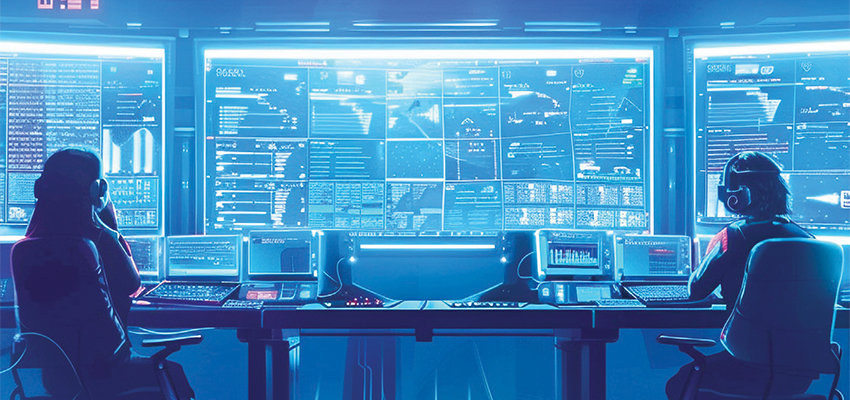Staying one step ahead of the threats

Corporate security management is a non-negotiable function for any company, and safeguarding it requires dedication and relentless effort. With the ever-increasing threats looming over organisations, businesses must step up to ensure their success. We spoke with Pushkar Kadadi, Product Manager, SecureLayer7, to better understand this critical concept
Corporate Citizen: What is corporate security management in layman's term and why does an organisation need it?
Pushkar Kadadi: A company is never entirely safe as constant threats loom, casting shadows over its success. However, with effective corporate security management, these hurdles can be overcome with ease. Corporate security management acts like a team of guardians, protecting a company from threats such as thefts, data breaches and sabotage. It involves implementing measures and policies to safeguard a company's people, assets, and information. Think of it as setting up locks, monitoring systems, or alarms—both physically and digitally—to defend against cyber-attacks and other risks.
Creating a safe environment
Organisations need corporate security management to ensure their operations run smoothly, free from internal or external threats. Protecting customer trust by securing their information is paramount. With that, it also shields the company from financial losses and reputational damage caused by security incidents. In essence, corporate security management is a must to maintain harmony and create a safe and stable environment where the business can thrive without undue risk.
CC: What types of corporate security threats an organisation might face?
Organisations today confront a variety of threats that can compromise their corporate security. A primary concern is the protection of digital assets, ranging from internal documents to sensitive customer data. As reliance on technology increases, so does the attack surface, the various points where an organisation is susceptible to security breaches. This includes APIs, which, while facilitating interactions between different software applications, can also become means for malicious attacks if not adequately safeguarded.
Additionally, insider threats pose a significant risk, with employees or contractors potentially misusing their access to steal information, sabotage systems, or engage in other harmful activities.
CC: Walk us through the evolution of corporate security management.
Corporate security management has evolved significantly, transforming from basic physical safeguards into a sophisticated blend of digital defences. Beginning in the 1950s, the focus was primarily on physical security, utilising guards and surveillance to protect assets. As businesses became increasingly dependent on digital infrastructure over the following decades, the scope of security expanded to include the protection of information and technology systems.
This evolution led to the adoption of advanced cybersecurity practices, such as regular penetration testing, integrating scanners into CI/CD pipelines and employing attack surface management solutions to monitor vulnerabilities. Today, corporate security management takes a holistic approach, merging traditional physical security measures with cutting edge cybersecurity technologies.
Modern security ecosystems rely heavily on real-time threat detection, robust data encryption, and proactive risk management across all platforms, ensuring comprehensive protection for both physical and digital assets.
CC: How has the role of corporate security management evolved with the rise of work- from-home?
The shift to remote and hybrid work, driven by circumstances, has significantly altered the landscape of corporate security management. The transition from traditional, perimeter-based security models to more dynamic and distributed approaches became essential. Previously focused on securing physical office environments and centralised IT infrastructures, corporate security management now must extend its protection to remote endpoints, including personal devices and home networks.
This evolution has led to the adoption of zero trust frameworks, where access controls are not just perimeter-based but are dynamically applied based on continuous verification of identities and device integrity. Additionally, the use of VPNs and endpoint detection and response (EDR) systems has become increasingly prevalent to ensure secure encrypted connections, and to monitor potential threats in real time. These measures reflect the new complexities and expanded attack surfaces introduced by remote work setups, highlighting the need for a more adaptable and comprehensive security strategy.
CC: What technologies are used to manage corporate security?
Corporate security is managed through advanced technologies, including firewalls, intrusion detection systems (IDS), and endpoint detection and response (EDR) tools. These systems help monitor and protect networks and devices from cyber threats.
Encryption is used to secure sensitive data in transit and at rest, while multi-factor authentication (MFA) adds an extra layer of protection for access control. Additionally, security information and event management (SIEM) tools analyse real-time security alerts, helping detect potential breaches early.
CC: In your opinion, what is the biggest threat to corporate security?
The biggest threat to corporate security today is social engineering. Despite having advanced technical defences, attackers often exploit human vulnerabilities through phishing or other manipulation techniques to gain unauthorised access. Educating employees and ensuring they understand the risks is as important as having solid technical measures.
CC: Can you walk us through the corporate security market and where India stands?
The global corporate security market is rapidly expanding, driven by the escalating threat of cyber-attacks and an increasing reliance on digital technology. This market includes a wide range of products and services, such as scanners, SIEM solutions, IDS, and attack surface management platforms. It also encompasses penetration testing and development security operations (DevSecOps). These solutions span from physical security measures to advanced cybersecurity software, all designed to protect assets and sensitive information security operations centres.
"Organisations need corporate security management to ensure their operations run smoothly, free from internal or external threats"
— Pushkar Kadadi
A significant player
India has emerged as a significant player in this sector, with its corporate security market booming due to the country's large IT industry and the sharp rise in cyber threats. Indian companies are making substantial investments in security measures, including advanced threat detection systems, encryption technologies, and security operations centres. Additionally, India boasts a vibrant cybersecurity talent pool that contributes both locally and globally. As digital transformation accelerates, India's role in shaping global security standards and innovations is becoming increasingly vital.
CC: What advice would you give a company looking to enhance its corporate security management practices?

Following these steps rigorously will help handle security breaches effectively, helping to quickly address threats and minimise potential damage, thereby keeping the company's operations secure and resilient.
- To strengthen corporate security management, companies should conduct a thorough security audit to spot any system vulnerabilities.
- Implementing a layered security strategy, which includes using advanced technologies such as IDS, data encryption, and MFA to enhance access controls, is vital.
- Deploying attack surface management solutions can help monitor all assets and their security status.
- Regular training and awareness programmes for employees are crucial to reduce risks associated with human error or insider threats.
- Companies should also update their systems and regularly apply patches to defend against new cyber threats.
- Finally, having a solid incident response plan in place is essential.
CC: What's the future of corporate security management?
The future of corporate security management is increasingly about staying one step ahead of threats in a world where technology evolves rapidly. As we continue to rely more on digital platforms and networks, security management will focus on proactive measures, using advanced technologies like artificial intelligence (AI) to predict and prevent attacks before they happen. This includes monitoring for unusual activity and automatically responding to threats in real time.